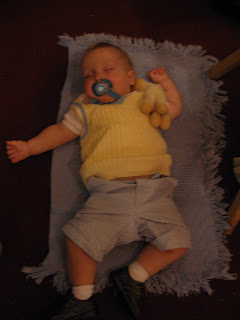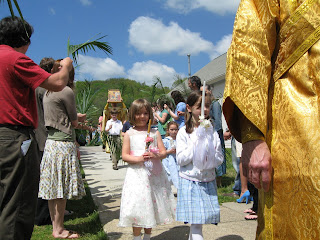Of course, I wouldn't have it any other way. I think church is supposed to take a lot out of you. It is supposed to be demanding, not convenient. I remember when I was a pastor and we made Easter morning into a huge production. There were slides, song specials, and scripture readings, as well as an unusually short sermon. Liturgically we tried to cram Good Friday, Holy Saturday, and Easter Sunday into one action-packed 90 minute service. The result was something shallow. Easy, but shallow. It felt very much like the performance it was.
Last Friday morning Stephanie took Kyla to decorate the bier where they would lay an icon of Christ for the service of Divine Lamentations. I stayed home to make preparations to break the fast. In other words, I was cooking what we would eat on Sunday morning.

That night, I took Kyla to the Divine Lamentations service where she stood with some of the teenagers singing around the body of Jesus. She probably could have picked up the tune, but I think she was struck with a bit of shyness.

One of the highlights of the night was when all the young girls were able to march around the church throwing rose petals. (I'll post pictures as soon as I get them).
Saturday morning we got up early to attend Holy Saturday services, where we commemorate Christ's entrance into Hell to release its captives. Several catechumens were also chrismated at this service. Then I tried to get the kids down for a nap (pretty much unsuccessfully) while Stephanie returned to the church to decorate it for that night. That evening, I had to cook some more food while Stephanie started getting the kids ready.
We arrived at church at 10:00. I apologize for the poor quality of these next pictures. I was trying not to use the flash, so it's a little blurred, but I wanted to get an image of the arch that Stephanie helped put together.

At about 11:00 or so the lights were dimmed as the voice of the priest rose above the hushed sounds of the congregation, "Come ye, take light from the Light that is never overtaken by night; come glorify Christ, risen from the dead." (That quote may not be exactly right since it's from memory.) Then we began to light our candles from the flame the priests and deacons were holding. After processing around the church, the priest announced that Christ is risen, while we responded, "Oh Christ is risen from the dead! Oh Christ is risen from the dead! Trampling down death by death and upon those in the tombs bestowing life!" This continues after we enter the church, with the priests marching down the aisles shouting in various languages, "Christ is Risen!" We shouted back, "He is risen indeed!"
These moments in particular were hard for George, who kept falling asleep but then would wake up every time a priest began censing his way down the church (but we finally got him to sleep).


That service lasted about three hours. So by 2:00 in the morning we were all very tired, but ready to continue our celebrations together by feasting.

The good news is that we were able to sleep in the next morning... Except we have kids. Scratch that. George was up by 7:30 and Kyla was up by 8:30.

After a great big breakfast (Pascha bread makes great French toast), we headed to a church-league softball game and then back to church for Agape Vespers. I read the Gospel in German. Others read in Russian, Greek, Japanese, Arabic, French, and Thai. This traditions expresses the universality of the message of the resurrection.
Being Southern and Orthodox we finished our Pascha celebrations with barbecue. The kids had an Easter egg hunt.
Some of the men sat outside enjoying their cigars.

Some of the women were dancing.

We got the kids to bed by 7:00 that night. They were out in a matter of minutes. Stephanie and I also tucked in early.
Of course, the celebrations don't really stop. This week is Bright Week. We will continue to sing Christ is risen until Pentecost, or is it Ascension? In any case, the celebrations will last for weeks, which is only fitting, since the preparations also lasted for weeks. This is the kind of toll church is supposed to exert on our bodies. It is how the church disciplines us, readies us for the Kingdom of Heaven. I have a black belt in Jujutsu. One of the techniques my sensei would use was very much like what the church does. Especially on cold mornings, he would have us do the same drill a hundred times until we were panting and out of breath. Then he would have us spar, but amazingly being so exhausted made sparring seem more natural. The church does something similar. It trains us by asking a lot of us. But the next time (the next Pascha) what we are asked to do doesn't seem quite so hard. The church also lets up on us a little bit. It asks us to sacrifice, but then it rewards our sacrifice with celebration. The fact that we fast before we feast is significant, because in that discipline the material and the spiritual merge together. Our desire for the resurrection is in some ways indistinguishable from our desire to eat together and to celebrate. Right now we are in a kind of special time (what the Greeks would call kairos). When Pentecost comes and we begin to enter normal time (chronos), putting an end to our celebration, but not really ending it, because we know that even as we leave this Pascha behind us, we are already getting ready for the next one to come again.




